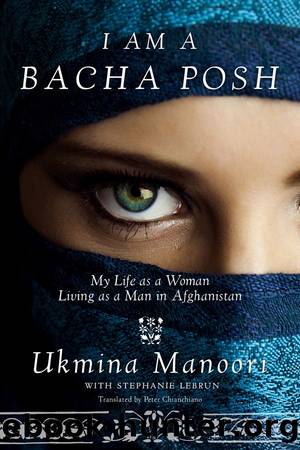I Am a Bacha Posh: My Life as a Woman Living as a Man in Afghanistan by Ukmina Manoori

Author:Ukmina Manoori [Manoori, Ukmina]
Language: eng
Format: azw3
Publisher: Skyhorse Publishing
Published: 2014-10-13T16:00:00+00:00
7
THE FIRST VOTE
2004
We were sitting cross-legged around the carpet where the evening meal was placed. Almonds, dried apricots, tomatoes, meatballs, kofta, and rice. It was nearly 7:00 p.m., and I had already plunged my fingers in the dish of lamb with yogurt and grapes. The whole family was together: my two brothers and their wives, my sister and her husband. After the death of my mother, they tried to be around me more. I did not form my own family; I have only them and their children.
The shorwa burned our lips, but it was good! My mother gave the recipe for this vegetable soup to my sister; she had a special way of cooking. With every sip, a pang of nostalgia hit me. I missed her.
We spoke very little, absorbed in our thoughts. Even I, usually so chatty, was quiet. The radio was turned on, as it always was during meals, and we listened to it absent-mindedly. It was our only link with the rest of the world. It was 2004, and electricity had still not been restored to the villages of the district. The Pashtun sounds of the provincial radio lull us: prayers and long radio talks about the political situation.
Once the Taliban “officially” left (though they were still there—I’d see them), Hamid Karzai ran the country. Sometimes we heard that he was working with the Americans, but he was a Pashtun, and, for that reason alone, we trusted him. We were tired of war: ten years of Soviet invasion, four years of conflict between the Mujahideen factions, years of anarchy of which the warlords, local mafia, and tyrants took advantage. Six years of Taliban rule, and then the American bombs.
I was lost in all of this, savoring a piece of Naan je Afghani, our bread, when all of the sudden my younger brother touched my arm: “Have you heard, Ukmina?”
No, I had not been listening. My ears perked up. According to the voice on the radio, there would soon be an election. We were going to vote twice: once to elect a president and another to choose the members of the parliament, the representatives of the people. The voice uses the word democracy, in English. There is no translation for this word in Pashto or Dari. However, we know this word, thanks to the Russians and their “Democratic Party”—not exactly a good memory.
But joy soon took over us. We were all standing around the radio, feeling that a great moment in history was taking place. We had all the reason in the world to feel skeptical, and yet we gave way to hope.
I stayed up late in the night to talk with my brothers and one of my sisters-in-law, and we drank gallons of tea. This was great news, even if we had few details. How was this vote going to work? Could women vote? They had had the right since 1963 but had never had the opportunity to exercise it. Words that had empty meanings for years came back into our discussion: peace, stability, human rights.
Download
This site does not store any files on its server. We only index and link to content provided by other sites. Please contact the content providers to delete copyright contents if any and email us, we'll remove relevant links or contents immediately.
Spare by Prince Harry The Duke of Sussex(5180)
Machine Learning at Scale with H2O by Gregory Keys | David Whiting(4295)
Never by Ken Follett(3937)
Harry Potter and the Goblet Of Fire by J.K. Rowling(3848)
I Have Something to Say by John Bowe(3496)
Unfinished: A Memoir by Priyanka Chopra Jonas(3382)
Fairy Tale by Stephen King(3370)
Greenlights by Matthew McConaughey(3165)
The Man Who Died Twice by Richard Osman(3072)
Will by Will Smith(2911)
Think Again by Adam Grant(2459)
Rationality by Steven Pinker(2352)
It Starts With Us (It Ends with Us #2) by Colleen Hoover(2345)
Can't Hurt Me: Master Your Mind and Defy the Odds - Clean Edition by David Goggins(2324)
The Dark Hours by Michael Connelly(2300)
The Storyteller by Dave Grohl(2229)
Friends, Lovers, and the Big Terrible Thing by Matthew Perry(2219)
The Dawn of Everything: A New History of Humanity by David Graeber & David Wengrow(2197)
The Becoming by Nora Roberts(2189)
